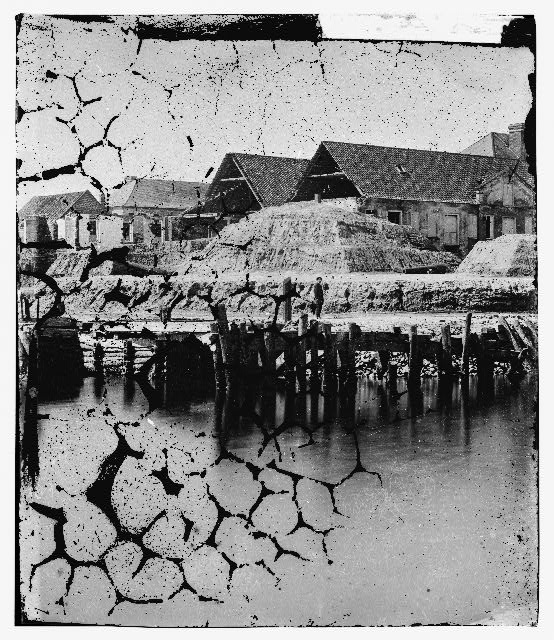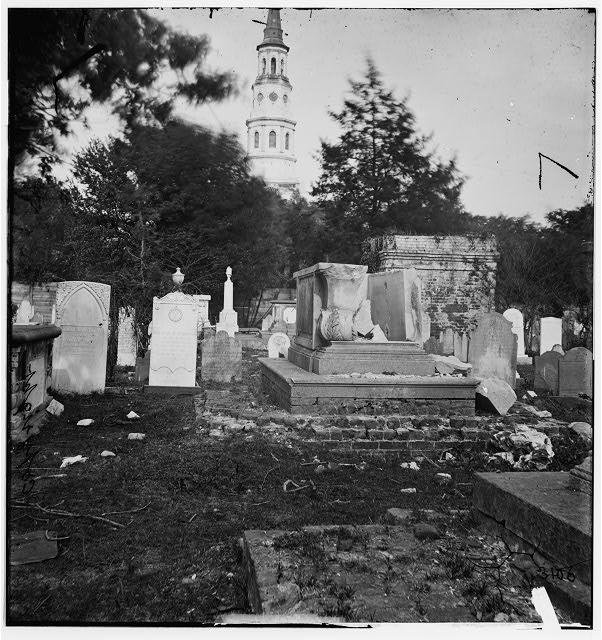Charleston’s Surrender
On February 18, 1865, Charleston, South Carolina surrendered. It had been just two months shy of four years since the war officially began with the firing on Fort Sumter in Charleston’s harbor and the city had experience war, losses, and destruction first hand.
Union General William T. Sherman had described the harbor city as already wrecked by war, and it was not a major objective on his campaign list. In his memoirs, he reported the news of the capture briefly: Charleston was, in fact, evacuated by General Hardee on the 18th of February, and was taken possession of by a brigade of General Fosters troops, commanded by General Schimmelpfennig, the same day.
The event had a much greater significance on the Confederate mind, especially since South Carolina had been the starting place of the war—a fact that the newly arrived Union troops recognized.
Confederate civilian Mary Chesnut got news of Charleston on February 23, 1865, and wrote with much emotion:
“Charleston and Wilmington—surrendered. I have no further use for a newspaper. I never want to see another one as long as I live. . . . Shame, disgrace, beggary—all at once. Hard to bear.
Grand smash—
Rain—rain outside—inside naught but drowning floods of tears.”
A few photographs of Charleston from 1865 illustrate the war’s destruction on the city and some of the coming challenges during Reconstruction:





And so the Constitution and our bill of rights were shredded and disregarded and the government our Founding fathers gave us was forever changed.
Robert… our Confederate ancestors, with their own agency, chose to break with the Constitution and bill of rights. They have only themselves to blame. They chose secession… secession from the Constitution and the bill of rights. It was their choice alone. Nobody made them do it. Arguably they could have more better protected their rights, if they had remained in the Union.
Some of the photos above don’t show war destruction, but the simple destruction of fire. Charleston suffered a major fire in 1861. The war did keep the people from mostly rebuilding until after the war.
There was No fire in 1861…The freemasons you ALL call the “Founders” found Tartarian Empire buildings because Tartaria was Worldwide and then bombed our true history made us all slaves to their United States corporation after they wrote their own constitution completely nullifiying the American Republics constitution in 1776 in which the Turkish Moors were the people that started it and they were the dark skinned original inhabitants…. George Washington the freemason was a freemason lie.
Lyle, from the writings of our Founding fathers and the various colonial leaders, they made it very clear where the power of government came from…the people of each state controlled their own destinies. Lincoln himself stated, “I’m not going to let some piece of paper to keep me from holding the union together”.
After the war, the federal government didn’t dare prosecute and of the Southern leaders because it was very likely that the Supreme Court would have found that they waged an unconstitutional war against the states.
If what you say is true, than why did our Confederate ancestors ever secede? If the Supreme Court had their back in the argument, why secede in the first place?
It was also the U.S. Constitution that protected Robert E. Lee, Jefferson Davis, and others from being hanged as traitors after the war. The U.S. Constitution shielded them from prosecution. Can you join me in saying amen to that?
I can appreciate the Constitution protecting them from their own government, however, where was that garunteed protection for the American people when they excerised their constitutional rights? If our government doesn’t abide by its own Constitution, it is nothing more then a dictatorship. The cost in lives was close to 800,000 when you calculate in the Southern civilian population. There were no Marshall Plans from the north to help rebuild people’s homes, cities, towns or industry of the South.
In today’s climate of political discourse it could happen again.
Where was the Constitution when they seceded? From their own perspective it wasn’t anywhere, because they had seceded from the US Constitution.
The deep South states all seceded before any of their Constitutional rights had been violated. They openly organized and voted to secede because a Republican President had been elected President. That Presidential election wasn’t a violation of their Constitutional rights.
I’m not sure Virginia, North Carolina, and Tennessee ever had their Constitutional rights violated either. They seceded because of the call for troops. Where does is say the the President can’t call for state troops to protect the United States? There was even a precedent of doing this that had been set already by Andrew Jackson (slave owning white southerner) during the nullification crisis.
Lastly, the people in the slave states didn’t lose their constitutional property interests in their slaves until January 1, 1863… when all had already seceded and were actively rebelling against the Union, i.e. not under the protection of the Constitution or even in the political position to stop this because they purposefully left the Union.
Yes, 800,000 folks or so lost their lives thanks to the Civil War. Our Confederate ancestors deserve as much blame for that is anyone else, some more than others. Is it all on them? No, I don’t think so. I also blame people like John Brown and the Fireaters’ abolitionist counterparts in Congress. Neither cared to live among one another and it led to an ugly civil war.
Robert, very interesting point of view, I honestly haven’t pondered much on the legality of secession, but what you say about the people having the power in the government is very intriguing. You are correct, it was truly THE PEOPLE of the south who voted for secession. Might I add that I respect and honor the men who fought for that cause, but I’m glad they lost. I love my country too much today as it is and can’t or would prefer not to envision a world without us whole.
Lyle, one has to study the American Revolution and the founding fathers to understand where they stood on the delineation of powers between the Federal government and the States. Three colonies would not sign onto the compact unless they were assured that should their citizens decide to leave the union, the could do so.
When the British surrendered, they surrendered to the 13 Sovereign colonies, and that was the mindset of the people and founding fathers.
Great… and then a bunch of states seceded to form a totally new nation and the United States fought a war, which they won, to not allow it. The Confederates then returned to the fold of the United States and its Constitution. It’s a matter of history now Robert.
I don’t really understand what you’re trying to argue. The founders were all dead in 1861.The Confederates fired on a Union fort, which allowed Lincoln to call for troops, which led to VA, NC, and TN seceding… and the war commenced. Thomas Jefferson and John Adams couldn’t do a damn thing about it. And if you think the Supreme Court was going to stop Lincoln because you think his actions weren’t supported by the Constitution than our Confederate ancestors were imbeciles to have ever seceded in the first place. Our ancestors weren’t imbeciles Robert, they knew under the Constitution of the founders, slavery could be voted out of existence at some point. Thomas Jefferson saw this coming even before he died.
The point of all this is to educate those that are ignorant of American history prior to the war and what drove the Southern people to exercise their constitutional rights. The Victor’s always write history and there are always two sides to the story. The founding fathers were fearful of a strong central government that would lead to tyranny and this is just what happened during the war.
You mention Fort Sumpter…perhaps you are unaware that many federal forts were relinquished to their respective States. Lincoln was rather crafty in goading the South into firing the first shot to start the war.
The Confederate States didn’t leave the Union and the Constitution because of tyranny Robert. They didn’t stay in it to see what would happen. They left before anything unconstitutional was done to them.
Name a Federal fort that was relinquished under the order of President Lincoln? Did Lincoln relinquish Harper’s Ferry or Norfolk, or did our Confederate ancestors seize them by hook or by crook? Texas forts were demanded handed over by Confederate Texans and the Confederate sympathizing commanding General Twiggs surrendered them, but he didn’t relinquish them under the authority of President Buchanan, did he Robert? What about all the other federal arsenals in the South? Only when taken by force of arms did they become Confederate property.